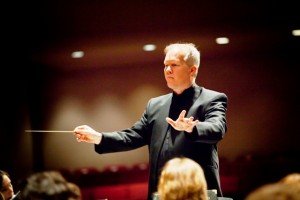The stakes are high for the arts. In an era where anything can be enhanced or corrected in a studio, live musicianship is valued less and less. And Kirk O’Riordan, assistant professor of music and director of the Lafayette College Concert Band, isn’t a naïve romanticist when it comes to his craft. Most of his students will enter professions other than music, which makes his job that much more important.
With the Concert Band, for instance, O’Riordan may have three or four music majors, meaning he has to teach the music theory and history concepts that non-majors do not typically take so that they can be successful performers. With a wide range of experiences and skill sets in one room, he cannot gloss over the fundamentals.

Professor Kirk O’Riordan conducts the Lafayette Concert Band.
In the classroom, O’Riordan focuses on helping students become informed and discriminating consumers of music and the arts, people who can articulate opinions beyond the simplicity of “I didn’t like it; it wasn’t what I am used to.” He has a small window to ignite a lifelong appreciation for music that will lead students to continue honing their own musical abilities, support live music after they leave Lafayette, and perform in community ensembles.
“Ultimately, they help create a market for professional musicians and form the nucleus of an intelligent, informed audience. The survival of live music depends on this type of audience,” he says. “I am fortunate to work in a department that shares these ideals. My colleagues are also committed to developing this kind of student because they know that the future of what we do as musicians depends on people like this.”
A professional composer and musician, O’Riordan says music is as crucial to his life as breathing. He is at work on his newest CD, Strange Flowers, set to release in the fall. It features his wife, Holly Roadfeldt, visiting instructor, on piano, Marianne Gythfeldt on clarinet, Lawrence Stomberg on cello, and Reuben Councill on flute. He has composed two new pieces for the compilation: Lacrimosa for solo piano and A Strange Flower for Birds and Butterflies for clarinet, cello, and piano. Composed for his wife in 2011, Lacrimosa is a post-minimalist piece, which uses repetition and other processes that define minimalism as the background structure for more traditional compositional procedures. A Strange Flower for Birds and Butterflies was inspired by a Matsuo Basho haiku and is structured in the 5-7-5 syllable pattern of haiku.
O’Riordan founded the Lafayette College Contemporary Music Ensemble to challenge the most motivated and experienced student instrumental players in the department. As director of Concert Band, he began a program to develop student assistant conductors who rehearse and perform with the ensemble. The program is unique in that his assistant conductor gets more podium experience than most undergraduate conducting students at large music schools.
O’Riordan trusts his students enough to give them some of the most difficult, abstract, and even strange music to play because he knows they will give their best effort every time. He still considers himself a student of music, and writing for students allows him to experiment, re-voice a chord, add or remove instruments, and change percussion effects. His students have premiered several of his pieces, including four works for wind ensemble and three for chamber ensembles.
“The student performers are incredibly open to playing new music by me and other contemporary composers,” he says. “Their willingness to try my music has been both gratifying and helpful for me. This teaches me so much and helps me refine my skills. I am profoundly grateful to have students who will try to the height of their abilities to play what I have written for them. I don’t feel like I could get that many other places.”
The Percussion Ensemble performed one of those pieces, Night of Summer Stars, during a two-day dance performance at the Alvin Ailey Dance Theater in New York City, co-sponsored by Sakshi Productions, a dance company co-founded by Nandini Sikand, assistant professor of film and media studies. Sikand danced to O’Riordan’s piece along with Carrie Rohman, assistant professor of English, who also choreographed the routine. Larry Stockton, professor and head of music and director of Percussion Ensemble, played with the ensemble.
Night of Summer Stars is a perfect example of O’Riordan’s affinity for collaboration. He shares the credit for Concert Band’s success with, among many others, assistant conductor Alex Cutrone ’13 (Yorktown Heights, N.Y.) and ensemble leaders Taylor Dougherty ’13 (Parlin, N.J.) and Andrew Rowland ’13 (Haddonfield, N.J.). Principal players in both Concert Band and the Contemporary Music Ensemble perform similar tasks as principals in professional orchestras such as leading their sections, running sectional rehearsals, and assigning divided parts.
“None of these ideas would be possible without students who are willing to take a leap of faith that they could be successful doing things that undergraduates in large music schools would not usually have the chance to do,” says O’Riordan. “Teaching composition is really a two-way street: I get to learn from and be inspired by students’ thoughts, too.”
